- NEW: Obama to West Africans: "We know how to" stop Ebola from spreading
- NEW: U.S. official: 500 from CDC working on Ebola; 100 government workers in region
- CDC director: "Hugely fast increase" in harder-to-manage Ebola cases of late
- Liberian President: "We feel saddened" by the international response to the crisis
(CNN) -- The Ebola outbreak is much worse than official figures show and is "spiraling out of control," a leading U.S. official said Tuesday -- due in part, he said, to some countries that inadvertently have made it harder to corral the deadly disease.
Centers for Disease Control and Prevention Director Dr. Tom Frieden offered his stark commentary to CNN a day after Ellen Johnson Sirleaf, the president of Liberia, voiced dissatisfaction with the world response so far.
"In a way, we feel saddened by the response," President Sirleaf said.
More than 3,000 people have been infected by Ebola in Liberia, Guinea, Sierra Leone and Nigeria since the first documented cases in December, according to the World Health Organization. At least 1,552 have died.
Human trial of experimental Ebola vaccine begins
 Life in 'Ebola Country'
Life in 'Ebola Country'  Liberian President: We need hope, help
Liberian President: We need hope, help 
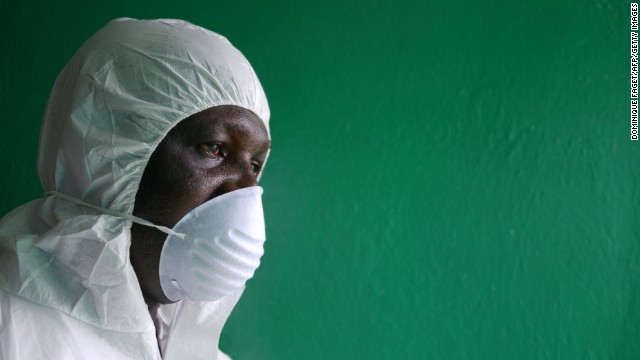 A health worker wearing a protective suit conducts an Ebola prevention drill at the port in Monrovia on Friday, August 29. Health officials say the current Ebola outbreak in West Africa is the deadliest ever.
A health worker wearing a protective suit conducts an Ebola prevention drill at the port in Monrovia on Friday, August 29. Health officials say the current Ebola outbreak in West Africa is the deadliest ever.  Senegalese Health Minister Awa Marie Coll-Seck gives a press conference on August 29 in Dakar to confirm the first case of Ebola in Senegal. The health minister announced that a young Guinean had tested positive for the deadly virus.
Senegalese Health Minister Awa Marie Coll-Seck gives a press conference on August 29 in Dakar to confirm the first case of Ebola in Senegal. The health minister announced that a young Guinean had tested positive for the deadly virus.  Volunteers working with the bodies of Ebola victims in Kenema, Sierra Leone, sterilize their uniforms on Sunday, August 24.
Volunteers working with the bodies of Ebola victims in Kenema, Sierra Leone, sterilize their uniforms on Sunday, August 24.  A Liberian Ministry of Health worker checks people for symptoms of Ebola at a checkpoint near the international airport in Dolo Town, Liberia, on August 24.
A Liberian Ministry of Health worker checks people for symptoms of Ebola at a checkpoint near the international airport in Dolo Town, Liberia, on August 24.  A guard stands at a checkpoint on Saturday, August 23, between the cities of Kenema and Kailahun in Sierra Leone, which have been quarantined due to the Ebola outbreak.
A guard stands at a checkpoint on Saturday, August 23, between the cities of Kenema and Kailahun in Sierra Leone, which have been quarantined due to the Ebola outbreak.  A burial team from the Liberian Ministry of Health unloads the bodies of Ebola victims onto a funeral pyre at a crematorium on Friday, August 22, in Marshall, Liberia.
A burial team from the Liberian Ministry of Health unloads the bodies of Ebola victims onto a funeral pyre at a crematorium on Friday, August 22, in Marshall, Liberia.  A humanitarian group worker, right, throws water in a small bag to West Point residents behind the fence of a holding area, as they wait for a second consignment of food from the Liberian government to be handed out in Monrovia, Liberia. The military began enforcing a quarantine on West Point, a congested slum of 75,000, fearing a spread of the Ebola virus.
A humanitarian group worker, right, throws water in a small bag to West Point residents behind the fence of a holding area, as they wait for a second consignment of food from the Liberian government to be handed out in Monrovia, Liberia. The military began enforcing a quarantine on West Point, a congested slum of 75,000, fearing a spread of the Ebola virus.  Dr. Kent Brantly leaves Emory University Hospital on Thursday, August 21, after being declared no longer infectious from the Ebola virus. Brantly was one of two American missionaries brought to Emory for treatment of the deadly virus, which has killed more than 1,350 people in West Africa since March, according to the World Health Organization.
Dr. Kent Brantly leaves Emory University Hospital on Thursday, August 21, after being declared no longer infectious from the Ebola virus. Brantly was one of two American missionaries brought to Emory for treatment of the deadly virus, which has killed more than 1,350 people in West Africa since March, according to the World Health Organization.  Ebola survivor Dr. Kent Brantly, right, hugs a member of the Emory University Hospital staff after being released from treatment in Atlanta on August 21.
Ebola survivor Dr. Kent Brantly, right, hugs a member of the Emory University Hospital staff after being released from treatment in Atlanta on August 21.  Family members of West Point district commissioner Miata Flowers flee the slum in Monrovia, Liberia, while being escorted by the Ebola Task Force on Wednesday, August 20.
Family members of West Point district commissioner Miata Flowers flee the slum in Monrovia, Liberia, while being escorted by the Ebola Task Force on Wednesday, August 20.  An Ebola Task Force soldier beats a local resident while enforcing a quarantine on the West Point slum on August 20.
An Ebola Task Force soldier beats a local resident while enforcing a quarantine on the West Point slum on August 20.  Local residents gather around a very sick Saah Exco, 10, in a back alley of the West Point slum on Tuesday, August 19. The boy was one of the patients that was pulled out of a holding center for suspected Ebola patients after the facility was overrun and closed by a mob on August 16. A local clinic then refused to treat Saah, according to residents, because of the danger of infection. Although he was never tested for Ebola, Saah's mother and brother died in the holding center.
Local residents gather around a very sick Saah Exco, 10, in a back alley of the West Point slum on Tuesday, August 19. The boy was one of the patients that was pulled out of a holding center for suspected Ebola patients after the facility was overrun and closed by a mob on August 16. A local clinic then refused to treat Saah, according to residents, because of the danger of infection. Although he was never tested for Ebola, Saah's mother and brother died in the holding center.  A burial team wearing protective clothing retrieves the body of a 60-year-old Ebola victim from his home near Monrovia on Sunday, August 17.
A burial team wearing protective clothing retrieves the body of a 60-year-old Ebola victim from his home near Monrovia on Sunday, August 17.  lija Siafa, 6, stands in the rain with his 10-year-old sister, Josephine, while waiting outside Doctors Without Borders' Ebola treatment center in Monrovia on August 17. The newly built facility will initially have 120 beds, making it the largest-ever facility for Ebola treatment and isolation.
lija Siafa, 6, stands in the rain with his 10-year-old sister, Josephine, while waiting outside Doctors Without Borders' Ebola treatment center in Monrovia on August 17. The newly built facility will initially have 120 beds, making it the largest-ever facility for Ebola treatment and isolation.  Brett Adamson, a staff member from Doctors Without Borders, hands out water to sick Liberians hoping to enter the new Ebola treatment center on August 17.
Brett Adamson, a staff member from Doctors Without Borders, hands out water to sick Liberians hoping to enter the new Ebola treatment center on August 17.  Workers prepare the new Ebola treatment center on August 17.
Workers prepare the new Ebola treatment center on August 17.  A body, reportedly a victim of Ebola, lies on a street corner in Monrovia on Saturday, August 16.
A body, reportedly a victim of Ebola, lies on a street corner in Monrovia on Saturday, August 16.  Liberian police depart after firing shots in the air while trying to protect an Ebola burial team in the West Point slum of Monrovia on August 16. A crowd of several hundred local residents reportedly drove away the burial team and their police escort. The mob then forced open an Ebola isolation ward and took patients out, saying the Ebola epidemic is a hoax.
Liberian police depart after firing shots in the air while trying to protect an Ebola burial team in the West Point slum of Monrovia on August 16. A crowd of several hundred local residents reportedly drove away the burial team and their police escort. The mob then forced open an Ebola isolation ward and took patients out, saying the Ebola epidemic is a hoax.  A crowd enters the grounds of an Ebola isolation center in the West Point slum on August 16. The mob was reportedly shouting, "No Ebola in West Point."
A crowd enters the grounds of an Ebola isolation center in the West Point slum on August 16. The mob was reportedly shouting, "No Ebola in West Point."  A health worker disinfects a corpse after a man died in a classroom being used as an Ebola isolation ward Friday, August 15, in Monrovia.
A health worker disinfects a corpse after a man died in a classroom being used as an Ebola isolation ward Friday, August 15, in Monrovia.  A boy tries to prepare his father before they are taken to an Ebola isolation ward August 15 in Monrovia.
A boy tries to prepare his father before they are taken to an Ebola isolation ward August 15 in Monrovia.  Kenyan health officials take passengers' temperature as they arrive at the Jomo Kenyatta International Airport on Thursday, August 14, in Nairobi, Kenya.
Kenyan health officials take passengers' temperature as they arrive at the Jomo Kenyatta International Airport on Thursday, August 14, in Nairobi, Kenya.  A hearse carries the coffin of Spanish priest Miguel Pajares after he died at a Madrid hospital on Tuesday, August 12. Pajares, 75, contracted Ebola while he was working as a missionary in Liberia.
A hearse carries the coffin of Spanish priest Miguel Pajares after he died at a Madrid hospital on Tuesday, August 12. Pajares, 75, contracted Ebola while he was working as a missionary in Liberia.  A member of the Centers for Disease Control and Prevention leads a training session on Ebola infection control Monday, August 11, in Lagos, Nigeria.
A member of the Centers for Disease Control and Prevention leads a training session on Ebola infection control Monday, August 11, in Lagos, Nigeria.  Health workers in Kenema, Sierra Leone, screen people for the Ebola virus on Saturday, August 9, before they enter the Kenema Government Hospital.
Health workers in Kenema, Sierra Leone, screen people for the Ebola virus on Saturday, August 9, before they enter the Kenema Government Hospital.  A health worker at the Kenema Government Hospital carries equipment used to decontaminate clothing and equipment on August 9.
A health worker at the Kenema Government Hospital carries equipment used to decontaminate clothing and equipment on August 9.  Health care workers wear protective gear at the Kenema Government Hospital on August 9.
Health care workers wear protective gear at the Kenema Government Hospital on August 9.  Paramedics in protective suits move Pajares, the infected Spanish priest, at Carlos III Hospital in Madrid on Thursday, August 7. He died five days later.
Paramedics in protective suits move Pajares, the infected Spanish priest, at Carlos III Hospital in Madrid on Thursday, August 7. He died five days later.  Nurses carry the body of an Ebola victim from a house outside Monrovia on Wednesday, August 6.
Nurses carry the body of an Ebola victim from a house outside Monrovia on Wednesday, August 6.  A Nigerian health official wears protective gear August 6 at Murtala Muhammed International Airport in Lagos.
A Nigerian health official wears protective gear August 6 at Murtala Muhammed International Airport in Lagos. 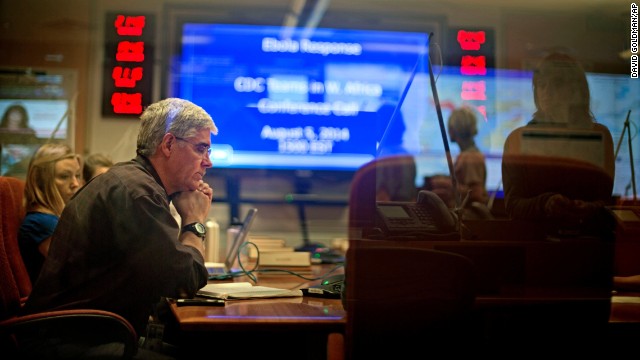 Officials with the Centers for Disease Control and Prevention in Atlanta sit in on a conference call about Ebola with CDC team members deployed in West Africa on Tuesday, August 5.
Officials with the Centers for Disease Control and Prevention in Atlanta sit in on a conference call about Ebola with CDC team members deployed in West Africa on Tuesday, August 5.  Aid worker Nancy Writebol, wearing a protective suit, gets wheeled on a gurney into Emory University Hospital in Atlanta on August 5. A medical plane flew Writebol from Liberia to the United States after she and her colleague Dr. Kent Brantly were infected with the Ebola virus in the West African country.
Aid worker Nancy Writebol, wearing a protective suit, gets wheeled on a gurney into Emory University Hospital in Atlanta on August 5. A medical plane flew Writebol from Liberia to the United States after she and her colleague Dr. Kent Brantly were infected with the Ebola virus in the West African country.  Nigerian health officials are on hand to screen passengers at Murtala Muhammed International Airport on Monday, August 4.
Nigerian health officials are on hand to screen passengers at Murtala Muhammed International Airport on Monday, August 4. 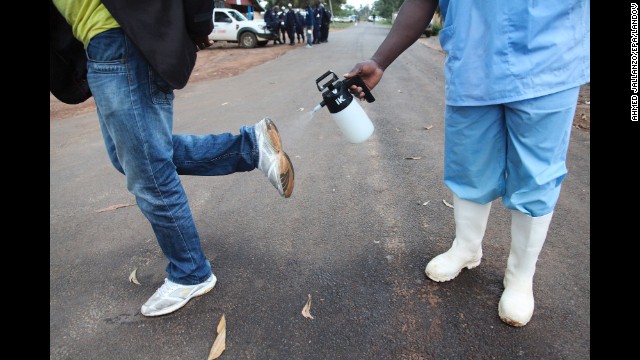 A man gets sprayed with disinfectant Sunday, August 3, in Monrovia.
A man gets sprayed with disinfectant Sunday, August 3, in Monrovia.  Dr. Kent Brantly, right, gets out of an ambulance after arriving at Emory University Hospital in Atlanta on Saturday, August 2. Brantly was infected with the Ebola virus in Africa, but he was brought back to the United States for further treatment.
Dr. Kent Brantly, right, gets out of an ambulance after arriving at Emory University Hospital in Atlanta on Saturday, August 2. Brantly was infected with the Ebola virus in Africa, but he was brought back to the United States for further treatment.  Nurses wearing protective clothing are sprayed with disinfectant Friday, August 1, in Monrovia after they prepared the bodies of Ebola victims for burial.
Nurses wearing protective clothing are sprayed with disinfectant Friday, August 1, in Monrovia after they prepared the bodies of Ebola victims for burial.  A nurse disinfects the waiting area at the ELWA Hospital in Monrovia on Monday, July 28.
A nurse disinfects the waiting area at the ELWA Hospital in Monrovia on Monday, July 28.  Liberian President Ellen Johnson Sirleaf, right, walks past an Ebola awareness poster in downtown Monrovia as Liberia marked the 167th anniversary of its independence Saturday, July 26. The Liberian government dedicated the anniversary to fighting the deadly disease.
Liberian President Ellen Johnson Sirleaf, right, walks past an Ebola awareness poster in downtown Monrovia as Liberia marked the 167th anniversary of its independence Saturday, July 26. The Liberian government dedicated the anniversary to fighting the deadly disease.  In this photo provided by Samaritan's Purse, Dr. Kent Brantly, left, treats an Ebola patient in Monrovia. On July 26, the North Carolina-based group said Brantly tested positive for the disease. Days later, Brantly arrived in Georgia to be treated at an Atlanta hospital, becoming the first Ebola patient to knowingly be treated in the United States.
In this photo provided by Samaritan's Purse, Dr. Kent Brantly, left, treats an Ebola patient in Monrovia. On July 26, the North Carolina-based group said Brantly tested positive for the disease. Days later, Brantly arrived in Georgia to be treated at an Atlanta hospital, becoming the first Ebola patient to knowingly be treated in the United States.  A 10-year-old boy whose mother was killed by the Ebola virus walks with a doctor from the aid organization Samaritan's Purse after being taken out of quarantine Thursday, July 24, in Monrovia.
A 10-year-old boy whose mother was killed by the Ebola virus walks with a doctor from the aid organization Samaritan's Purse after being taken out of quarantine Thursday, July 24, in Monrovia. 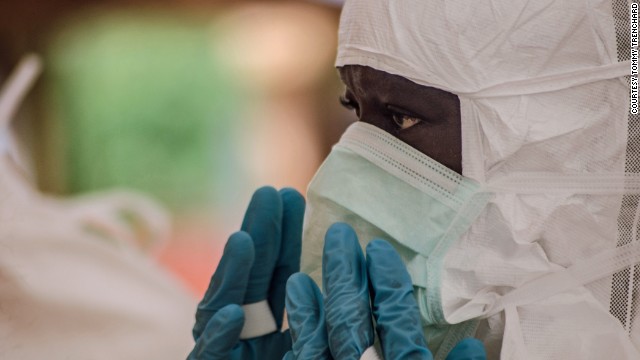 A doctor puts on protective gear at the treatment center in Kailahun, Sierra Leone, on Sunday, July 20.
A doctor puts on protective gear at the treatment center in Kailahun, Sierra Leone, on Sunday, July 20.  Members of Doctors Without Borders adjust tents in the isolation area in Kailahun on July 20.
Members of Doctors Without Borders adjust tents in the isolation area in Kailahun on July 20. 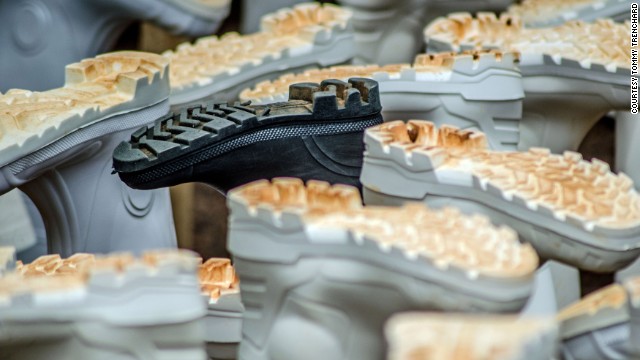 Boots dry in the Ebola treatment center in Kailahun on July 20.
Boots dry in the Ebola treatment center in Kailahun on July 20.  Red Cross volunteers prepare to enter a house where an Ebola victim died in Pendembu, Sierra Leone, on Friday, July 18.
Red Cross volunteers prepare to enter a house where an Ebola victim died in Pendembu, Sierra Leone, on Friday, July 18.  Dr. Jose Rovira of the World Health Organization takes a swab from a suspected Ebola victim in Pendembu on July 18.
Dr. Jose Rovira of the World Health Organization takes a swab from a suspected Ebola victim in Pendembu on July 18.  Red Cross volunteers disinfect each other with chlorine after removing the body of an Ebola victim from a house in Pendembu on July 18.
Red Cross volunteers disinfect each other with chlorine after removing the body of an Ebola victim from a house in Pendembu on July 18.  A dressing assistant prepares a Doctors Without Borders member before entering an isolation ward Thursday, July 17, in Kailahun.
A dressing assistant prepares a Doctors Without Borders member before entering an isolation ward Thursday, July 17, in Kailahun.  A doctor works in the field laboratory at the Ebola treatment center in Kailahun on July 17.
A doctor works in the field laboratory at the Ebola treatment center in Kailahun on July 17.  Doctors Without Borders staff prepare to enter the isolation ward at an Ebola treatment center in Kailahun on July 17.
Doctors Without Borders staff prepare to enter the isolation ward at an Ebola treatment center in Kailahun on July 17.  A health worker with disinfectant spray walks down a street outside the government hospital in Kenema, Sierra Leone, on Thursday, July 10.
A health worker with disinfectant spray walks down a street outside the government hospital in Kenema, Sierra Leone, on Thursday, July 10.  Dr. Mohamed Vandi of the Kenema Government Hospital trains community volunteers who will aim to educate people about Ebola in Sierra Leone.
Dr. Mohamed Vandi of the Kenema Government Hospital trains community volunteers who will aim to educate people about Ebola in Sierra Leone.  Police block a road outside Kenema to stop motorists for a body temperature check on Wednesday, July 9.
Police block a road outside Kenema to stop motorists for a body temperature check on Wednesday, July 9.  A woman has her temperature taken at a screening checkpoint on the road out of Kenema on July 9.
A woman has her temperature taken at a screening checkpoint on the road out of Kenema on July 9.  A member of Doctors Without Borders puts on protective gear at the isolation ward of the Donka Hospital in Conakry, Guinea, on Saturday, June 28.
A member of Doctors Without Borders puts on protective gear at the isolation ward of the Donka Hospital in Conakry, Guinea, on Saturday, June 28.  Airport employees check passengers in Conakry before they leave the country on Thursday, April 10.
Airport employees check passengers in Conakry before they leave the country on Thursday, April 10.  CNN's Dr. Sanjay Gupta, left, works in the World Health Organization's mobile lab in Conakry. Gupta traveled to Guinea in April to report on the deadly virus.
CNN's Dr. Sanjay Gupta, left, works in the World Health Organization's mobile lab in Conakry. Gupta traveled to Guinea in April to report on the deadly virus.  A Guinea-Bissau customs official watches arrivals from Conakry on Tuesday, April 8.
A Guinea-Bissau customs official watches arrivals from Conakry on Tuesday, April 8.  Egidia Almeida, a nurse in Guinea-Bissau, scans a Guinean citizen coming from Conakry on April 8.
Egidia Almeida, a nurse in Guinea-Bissau, scans a Guinean citizen coming from Conakry on April 8.  A scientist separates blood cells from plasma cells to isolate any Ebola RNA and test for the virus Thursday, April 3, at the European Mobile Laboratory in Gueckedou, Guinea.
A scientist separates blood cells from plasma cells to isolate any Ebola RNA and test for the virus Thursday, April 3, at the European Mobile Laboratory in Gueckedou, Guinea.  Members of Doctors Without Borders carry a dead body in Gueckedou on Friday, April 1.
Members of Doctors Without Borders carry a dead body in Gueckedou on Friday, April 1.  Gloves and boots used by medical personnel dry in the sun April 1 outside a center for Ebola victims in Gueckedou.
Gloves and boots used by medical personnel dry in the sun April 1 outside a center for Ebola victims in Gueckedou. 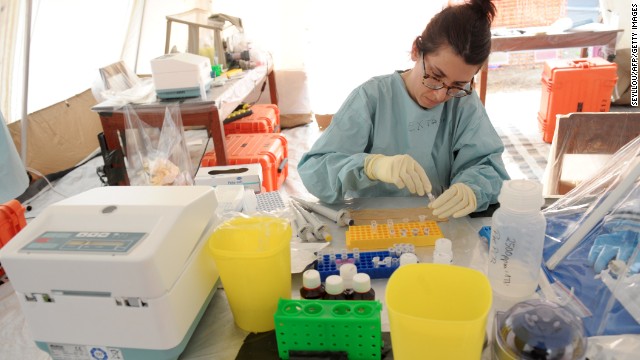 A health specialist works Monday, March 31, in a tent laboratory set up at a Doctors Without Borders facility in southern Guinea.
A health specialist works Monday, March 31, in a tent laboratory set up at a Doctors Without Borders facility in southern Guinea. 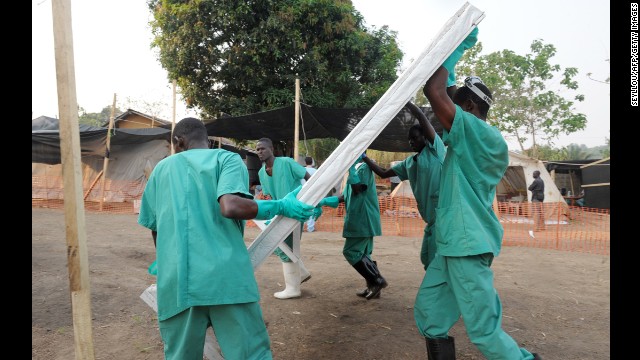 Health specialists work March 31 at an isolation ward for patients at the facility in southern Guinea.
Health specialists work March 31 at an isolation ward for patients at the facility in southern Guinea.  Workers associated with Doctors Without Borders prepare isolation and treatment areas Friday, March 28, in Guinea.
Workers associated with Doctors Without Borders prepare isolation and treatment areas Friday, March 28, in Guinea.  Photos: Ebola outbreak in Africa
Photos: Ebola outbreak in Africa Making it worse, Frieden said, is how other countries have turned their backs on those coming from countries where the outbreak is strongest, even if they don't realize it.
Measures to restrict flights and border crossings into the countries facing the outbreak were designed to contain the spread, but are having a paradoxical effect, he explained.
"This is making it really hard to get help in and to respond effectively to the outbreak," he said on CNN's "New Day."
"What we're seeing is a ... hugely fast increase in cases that's harder and harder to manage," he said. "The more we can get in there and tamp that down, the fewer cases we'll have in the weeks and months to come."
The president of Doctors Without Borders sharply criticized what she called the "global coalition of inaction" for focusing on insulating their nations instead of helping those in Africa who need it most. Dr. Joanne Liu said centers run by her group have turned away sick because they are too full, as an ever-increasing number of people develop symptoms of Ebola.
"States with the required capacity have a political and humanitarian responsibility to come forward and offer a desperately needed, concrete response to the disaster unfolding in front of the world's eyes ... rather than limit their response to the potential arrival of an infected patient in their countries," Liu said.
In her CNN interview, President Sirleaf of Liberia appealed for other nations to "please work as partners with us" by offering monetary, health care, logistical and other assistance, yes, but also by giving moral and personal support to a problem that's affected millions already.
"Give us hope by joining us in this fight," Sirleaf said. "Don't instill fear. We need that hope, we need that assistance, we need for Liberians to know that this war can be won."
Obama sends message to people of West Africa
The U.S. government tried to get front-and-center on the issue Tuesday, led by President Barack Obama.
Speaking "directly to ... the people of West Africa" in a video message, Obama said America's prayers are with those impacted by the disease and reiterated basic facts to educate locals on how Ebola spreads.
"Stopping this disease won't be easy, but we know how to do it," Obama said. "You are not alone. Together, we can treat those who are sick with respect and dignity, we can save lives, and our countries can work together to improve public health so this kind of outbreak doesn't happen again."
Obama insisted his government is working those in Africa to make a difference: To this point, White House spokesman Josh Earnest said more than 500 staff members from the CDC -- the U.S. health agency focused on infectious diseases, including Ebola -- are on the case, including 70 of the roughly 100 U.S. government personnel that are on the ground in hard-hit areas.
These government workers in Guinea, Liberia, Nigeria and Sierra Leone are doing things like "surveillance, contact tracing, database management and health education," Earnest said.
But they aren't the only Americans on the ground, putting themselves in harm's way to help others.
Many are there as part of humanitarian groups, like two who contracted Ebola earlier this summer. They were sent to Atlanta's Emory University Hospital, where they were treated and later released.
On Tuesday, a group called Serving in Mission announced that another American -- a doctor working in Liberia's capital --- had tested positive for Ebola.
The doctor, whose name was not released, was not treating Ebola patients and it's not known how he contracted the disease, SIM USA said. One of the other Americans infected with Ebola, Nancy Writebol, also was working on a SIM USA mission.
The unnamed American doctor immediately isolated himself upon the onset of symptoms, and is currently in an Ebola isolation unit, the group said.
"The doctor is doing well and is in good spirits," SIM USA said in a statement.
Sirleaf: 'We have no option but to succeed'
The prognosis for all of West Africa, though, isn't good.
Frieden, the CDC director, says what's happening now is worse that past Ebola outbreaks.
"This is the first epidemic spreading widely through many countries, and it is spiraling out of control," said Frieden, who recently returned from a trip to the region. "It's bad now, much worse than the numbers show. It's going to get even worse in the very near future."
That's bad news for places like Liberia, where President Sirleaf notes "primary ... hospitals have had to close because they became incubators for the disease and ... Ebola has been spreading quite rapidly."
The crisis is threatening already fragile economies.
Vincent Martin, head of the U.N.'s Food and Agriculture Organization's Dakar-based Resilience Hub, noted that some households in affected areas were spending up to 80% of their income on food before the outbreak -- and now prices are rising as people stock up on food, fearing it will run out.
Plus, restricted movement between countries has created labor shortages on farms, the FAO reports. The main harvest season for crops such as rice and maize is weeks away, and what was predicted to be a favorable harvest is now at risk, the agency said.
Then there's the matter of locals who can't work because they or loved ones are infected, who aren't going out and spending as much due to fears tied to the crisis, or whose livelihoods are threatened because economies have become more insulated.
Sirleaf says "the great progress" the economy of Liberia, at least, is now "under question because of the Ebola crisis."
That said, she stressed that there's only one path forward -- to defeat the disease and return to some semblance of normal.
"I'm very hopeful that we will beat this," the Liberian President said. "We have to. We have no option but to succeed in this."
READ: Life in the Ebola zone
READ: Ebola virus: Nine things to know
CNN's Michaela Pereira, Nima Elbagir, Jacque Wilson and Shelby Lin Erdman contributed to this report.
No comments:
Post a Comment